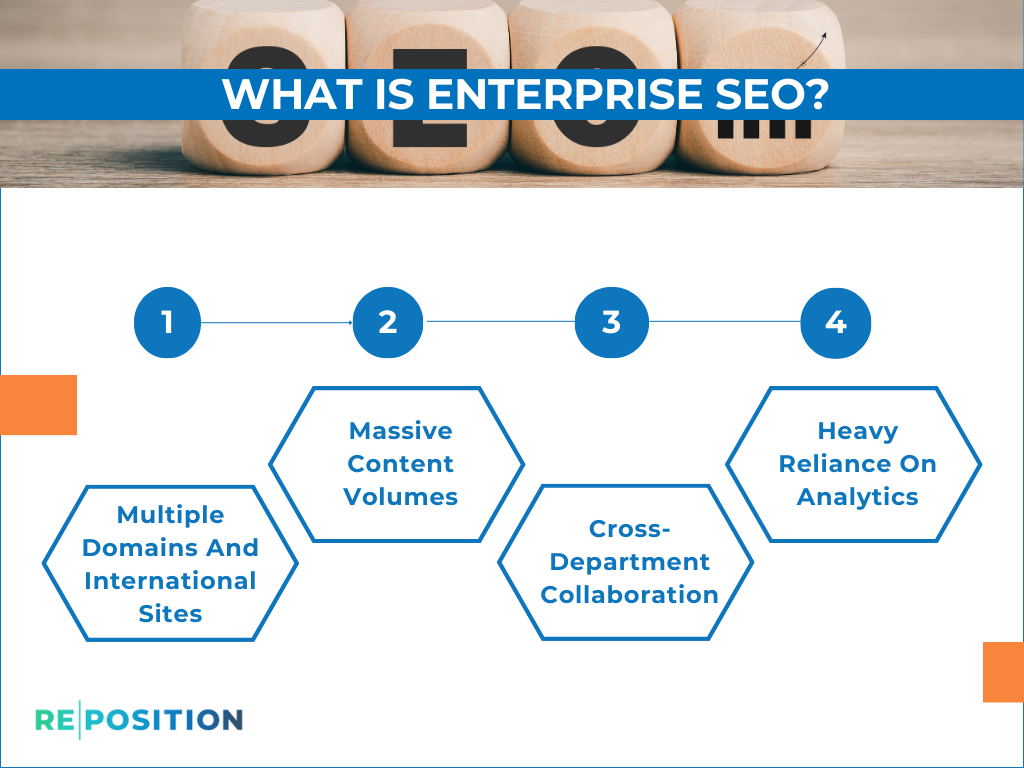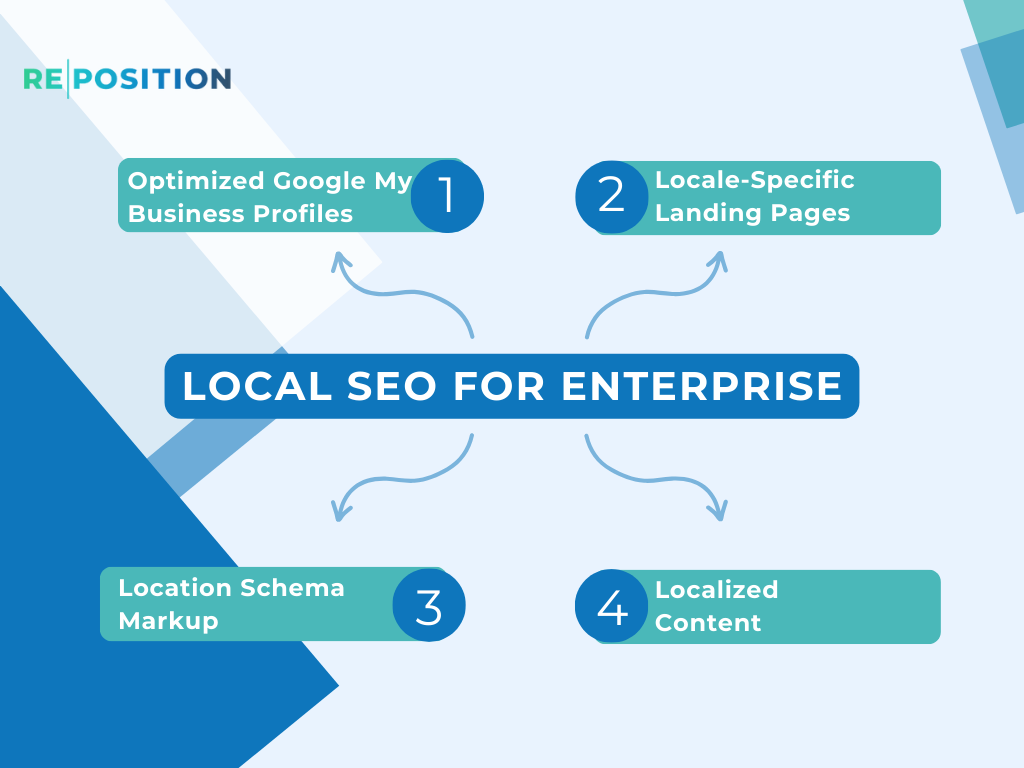Search engine optimization (SEO) has become an essential component of any successful online marketing strategy. With more and more consumers using search engines like Google to find products and services, having a strong SEO strategy is key to driving qualified traffic to your website.
As Thailand’s digital economy continues its upward trend, more enterprises are recognizing the value of optimizing online discoverability to connect with consumers. With millions of internet users and some of the highest social media engagement globally, implementing an effective search strategy allows brands to tap into qualified audiences researching products online.
However, when it comes to larger enterprises and corporations, SEO can become much more complex. Enterprise SEO comes with its unique challenges and requirements that set it apart from SEO for smaller businesses. In this guide, we’ll explore what exactly enterprise SEO is, why it’s important for larger organizations, and provide tips on building an effective enterprise SEO strategy.

Enterprise SEO refers to the SEO practices and strategies implemented by large corporations and enterprises. Unlike small business SEO which often focuses on just a single website, enterprise SEO deals with optimizing multiple domains, international websites, large volumes of content, and coordinating SEO efforts across multiple departments.
Some common characteristics of enterprise SEO include:
Multiple Domains And International Sites
Larger enterprises often have multiple domains and international websites that all need to be optimized together in a cohesive SEO strategy. This includes managing domains and sites specific to different regions as well as language considerations.
Massive Content Volumes
The amount of content an enterprise produces across all its properties is immense compared to smaller companies. This means enterprise SEO strategies must implement efficient ways to optimize huge volumes of pages, documents, videos, images, and other media.
Cross-Department Collaboration
For SEO to be truly effective on an enterprise scale, it cannot just be the domain of the marketing team. Enterprise SEO requires cross-department collaboration between marketing, product development, IT, content, and executives to align SEO with overarching business goals.
Heavy Reliance On Analytics
Enterprise websites generate huge amounts of user data. To measure the effectiveness of SEO efforts and know where to improve, enterprise SEO relies heavily on leveraging advanced analytics and tracking across all domains.
With a basic understanding of what enterprise SEO entails, you may be wondering why large corporations even bother investing resources into SEO in the first place. Here are some of the major reasons why enterprise SEO is crucial:
Lead Generation
Top rankings on high-traffic keywords drive qualified visitors to websites. For enterprises that offer B2B or D2C products and services, this incoming traffic represents a significant lead generation and sales potential from new prospects. Investing in enterprise SEO essentially puts any business in front of many more prospective customers.
Brand Visibility
Ranking highly in search engine results pages (SERPs) translates into tremendous visibility and reach for brands. Enterprise SEO done right positions brands as authoritative, trustworthy sources in their industry. For multinational brands, visibility and reputation in local markets is greatly amplified by localized SEO efforts.
Market Competitiveness
In almost every sector nowadays, consumers are likely to start their buying journey by entering a branded or generic search on Google. If your brand doesn’t show up while your competitors do, you lose out on sales opportunities. Enterprise SEO helps level the playing field so brands can stay competitive.
Cost-Efficiency
While, an investment, enterprise SEO delivers a substantial return on that investment and also proves more cost-efficient over time compared to other lead generation methods like PPC ads. SEO leads also convert better due to visitors’ existing interest as evidenced by search queries. This makes enterprise SEO both profitable and efficient.
Optimizing enterprise-level websites for search comes with greater complexity given the scale and intricacies involved. Here are some best practices that can set large organizations on the path to enterprise SEO success:
Conduct In-Depth Audits
Gaining a sense of your overall enterprise SEO health means auditing every domain and site across several critical elements:
Consolidate findings into actionable recommendations for improving problem areas.
Employ SEO Monitoring Tools
Enterprise sites have too many pages and assets to manually monitor for issues. Robust SEO tools and software that crawl sites, track rankings, analyze site speed, and monitor uptime are necessities for getting a handle on enterprise search presence.
Identify Gaps In Keyword Coverage
Many times enterprise sites don’t rank for terms and keywords they reasonably should. A strategic pillar of enterprise SEO is mapping out key terms tied to products, services, and thought leadership material along with their ranking positions and search volumes. This reveals gaps to target through content and optimization efforts.
Develop Documented SEO Guidelines
Maintaining search visibility and consistency across hundreds or thousands of pages requires laying out clear SEO rules and recommendations. Creating enterprise SEO guidelines that detail requirements for aspects like metadata, URL structuring, media optimization, etc. helps streamline efforts.
Structure Sites For SEO Efficiency
Information architecture decisions like site structure, internal linking, and URL naming conventions materially impact SEO capability. As opposed to retrofitting, designing sites upfront for SEO efficiency based on things like clustering-related content reduces workload down the line.
Align SEO With Business Goals
Enterprise SEO can’t be done in isolation from overarching business objectives. Collaboration between executives, product owners, and SEO practitioners is vital for ensuring SEO strategies target the right priorities whether that be increasing market share in Asia or boosting newsletter subscriptions.
An emerging consideration in enterprise SEO strategies is optimizing for voice search. As smart speakers like Amazon Alexa and Google Home proliferate along with voice assistants on mobile, people are increasingly using spoken natural language queries to find information online.
These types of voice searches now account for 20% or more of the total search volume. And given their conversational nature, voice keywords tend to be longer with different patterns compared to typed searches. Here are some tips on tuning enterprise SEO for voice:
Identify Relevant Voice Keywords
Start with looking at existing site search queries and web analytics to pinpoint questions and commands users say when engaging with your brand. You can find opportunities to answer and fulfil these voice information needs through content.
Optimize for Long-Tail, Conversational Queries
Spoken queries are often long, multi-intent questions containing multiple keywords e.g. “where are your store locations in Bangkok?”. Make sure pages target these natural language queries and answer comprehensively.
Highlight FAQs and How-To Guides
Questions like “How do I return a product?” and “What’s your refund policy?” will arise frequently in voice. Call attention to and link to FAQ pages, support content, and how-to articles to satisfy voice searches.
Improve Site Navigation and IA
Easy-to-use navigation with minimal clicks to key information is vital for voice SEO. Refine IA by adding supplemental categories and effective internal link schemes with related content clusters.

Geographical signals play an important role in search. For multi-location enterprises or brands looking to penetrate international markets, employing localization and geo-tagging builds organic visibility unique to those regions. Useful local SEO tactics include:
Optimized Google My Business Profiles
My Business listings containing accurate business info and locations help Google understand your on-the-ground presence. This gives a local SEO boost, especially for map pack results.
Locale-Specific Landing Pages
Creating dedicated locale homepages, product pages, or city/store pages enhances how search engines grasp your relevancy for geographic-intent queries like “electronics store Bangkok”
Location Schema Markup
Wherever suitable, incorporate schema markup denoting geographic locations – whether that be branch addresses, areas served, places of operation etc. This rich data aids ranking potential.
Localized Content
Tailor parts of sites, blogs, and pages to use locally popular terminology, city/region names, and location references relevant to citizens. This localization signals to Google the appropriateness of that content in the region.
On enterprise sites with huge amounts of pages, products, and complex functionality, technical SEO and infrastructure play a disproportionately large role. Core technical areas to optimize for enterprise include:
Site Speed Enhancements
Page load times directly correlate with user experience. For enterprises, site speed also directly correlates with SEO capability. Various speed optimizations like caching, image compression, minimization of redirects, DNS resolution etc. are necessary.
Scalable Hosting Infrastructure
Enterprise sites endure exponentially more traffic demands compared to smaller companies. Ensuring hosting solutions – whether on-premise or cloud – scale seamlessly as pageviews spike drastically during sales is vital for uptime.
Robust Internal Linking Scheme
Smart internal linking considering both user journeys and ranking potential guides search bots to the most important pages. This is achieved through well-planned primary, secondary, and tertiary navigation links on templates and individual content assets.
Automated Search Crawling
Automated search crawling is essential for managing enterprise-scale websites. As discussed, manually submitting site pages to search engines is impractical given the large content volumes involved. Key technical components that enable automated crawling include,
Automation combined with smart crawler guidance maximizes SEO capability at the enterprise scale while freeing up internal bandwidth. The specialized technology solutions outlined form the infrastructure supporting efficient automated enterprise search crawling.
With large enterprise SEO teams distributed globally and cross-functionally, maintaining standards around strategy, processes and reporting is paramount. This is where SEO governance plays a pivotal role.
SEO governance ensures consistency in how activities are executed and efficiency in how budgets are allocated across departments. Let’s examine the core components central to effective governance.
Centralized Enterprise SEO Standards
Create mandated guidelines around technical requirements, page optimization, taxonomy structures, content development, metadata formats and UX – allowing flexibility for regional adaptation. Governance ensures both compliance and consistency.
Rationalized Technologies And Vendors
Consolidate onto an approved stack of enterprise technologies and partner agencies to avoid fragmentation. Governance streamlines spending through preferred providers aligned with objectives.
Universal Performance Tracking
Standardize metrics definitions and reporting procedures aligning global and regional teams. Govern universally tracked KPIs tied to business results facilitated through centralized tech.
Cross-Functional Education Initiatives
Conduct SEO training boot camps across content, UX and technology teams to align on capabilities. Foster top-down and bottom-up collaboration.
Regular Reviews And Planning Cycles
Institute quarterly business reviews, planning sprints and budgeting cycles to manage initiatives across central and distributed teams toward overarching goals.
Driving alignment through governance ultimately accelerates execution velocity for enterprise SEO.
As we reach the end of this comprehensive guide on mastering enterprise SEO today, it’s also prudent to reflect on implications for the future with a few parting thoughts:
Commit To Being Future-Proof
Set standards for the use of structured data, page experience optimizations and tools flexibility to support innovations on the horizon from Google and other tech disruptors across search and customer experience.
Stay Close To Google’s Vision
Adhere closely to Google’s objectives around improving user experience and satisfaction through relevance, transparency and building trust. This aligns with their desired evolution for search.
Expect Further Personalization
Prepare for exponential growth in automated individualized experiences driven through predictive search, machine learning and AI – requiring coordination between martech stacks and content choreography.
Data Will Be More Integrated
As third-party cookies get phased out, first-party enterprise data play a bigger role integrated across customer touchpoints to personalize journeys while respecting consumer privacy.
The brands best able to adapt strategies spanning both martech and organic today will find themselves stronger suited for the enterprise SEO landscape of tomorrow powered by AI.
In closing, optimizing enterprise SEO requires immense coordination of teams, tools and activities across geographies to scale campaigns that accelerate growth. By following structured approaches to executing the foundations, tactics and governance policies covered in this guide, global organizations can build sustainable search visibility and results over the long term.
Remember, good things are not built in a day but rather through a commitment to long-term vision and fundamentals executed consistently with vigilance. Here’s to your own enterprise SEO success story over the next horizon.